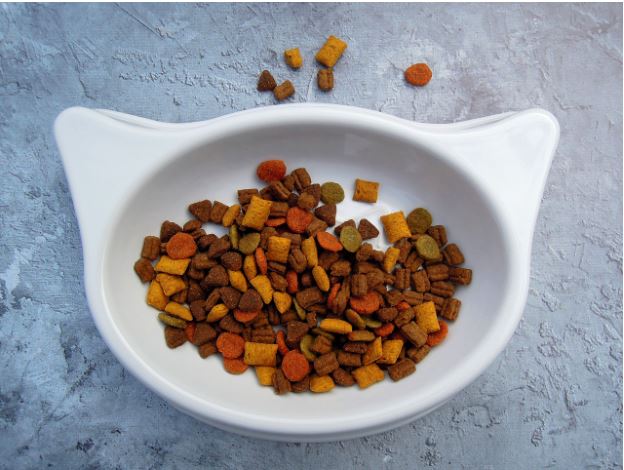
The pet industry has grown to a $320 billion market today. With the increase in pet ownership comes the need for pet food that is affordable, safe, and healthy for our fluffy friends.
But how do you choose healthy pet food? Knowing what to look for and what claims are legitimate for many pet parents can feel overwhelming.
Let’s dive into everything you must consider when buying food for your furry friend.
High-Quality Protein Source
Pets, especially cats and dogs, are naturally carnivores and require a diet rich in animal protein. Look for pet foods that list high-quality protein sources, such as chicken, turkey, beef, or fish, as the main ingredient. Avoid foods with vague protein descriptions like “meat by-products” or “animal meal.”
High-quality protein sources are more easily digestible for pets, allowing them to absorb and utilize the nutrients efficiently. This can improve muscle development, energy levels, and overall vitality. A protein-rich diet can also help support a healthy coat, skin, and immune system.
Complete and Balanced Nutrition
Complete and balanced nutrition is a fundamental aspect to consider. A “complete and balanced” label indicates that the food meets the least nutritional requirements established by the Association of American Feed Control Officials (AAFCO).
It ensures that the food provides all the essential nutrients. It includes proteins, fats, carbohydrates, vitamins, and minerals in proportion to your pet’s life stage.
Limited Fillers and Artificial Additives
When selecting pet food, it’s important to look for options that have limited fillers and avoid artificial additives. Fillers such as corn, wheat, and soy provide little nutritional value.
It can be challenging for some pets to digest. They may also contribute to allergies or digestive issues.
Artificial additives like preservatives, flavors, and colors are unnecessary. These can potentially harm your pet’s health.
Pet food with limited fillers and no artificial additives provide your pet with a more wholesome and natural diet. This supports better digestion and reduces the risk of adverse reactions. It promotes overall well-being.
Digestible Carbohydrates
Digestible carbohydrates play a role in providing energy and nutrients for pets. Opt for cat food and dog food with digestible carbohydrates like sweet potatoes, brown rice, or peas.
These carbohydrates are gentle on your pet’s digestive system. It provides a slow and steady release of energy. Avoid foods with excessive carbohydrates or ingredients like corn, wheat, or soy.
They may be more challenging for pets to digest, contributing to digestive issues or allergies.
Natural and Real Ingredients
Look for pet food brands that prioritize natural and real ingredients. The ingredient list should include recognizable items like specific meat and vegetable sources rather than generic terms.
The ingredients should be sourced from reputable suppliers. It should be free from hormones, antibiotics, and GMOs.
Special Dietary Needs
Special dietary needs should be taken into consideration when selecting pet food. Some pets have unique requirements due to allergies, sensitivities, or medical conditions.
For instance, food allergies or sensitivities are common in pets. Certain ingredients may trigger adverse reactions. In such cases, hypoallergenic pet foods or limited-ingredient diets can be beneficial.
These formulas contain novel protein sources and limited ingredients. It is to cut the risk of triggering an allergic response.
Pets with medical conditions like diabetes, kidney disease, or urinary issues may need prescription diets tailored to their needs. These diets are formulated to manage and support specific health conditions.
It provides the right balance of nutrients. It also controls certain components like carbohydrates, sodium, or phosphorus.
It’s crucial to consult with a veterinarian. This will help to identify any special dietary needs your pet may have.
The veterinarian can perform tests, provide a diagnosis, and recommend appropriate dietary options. They may suggest therapeutic diets that are designed to address your pet’s condition.
Consider Your Pet’s Age and Breed
Considering your pet’s age and breed is crucial when selecting the right pet food to meet its specific nutritional needs. Different life stages and breeds have varying requirements. You must provide them with the appropriate nutrition for their health and well-being.
Puppies and Kittens
Puppies and kittens have higher energy and growth demands than adults or seniors. They need a diet rich in calories, protein, and essential nutrients. It is to support their rapid growth and development.
Senior Pets
Senior pets may have reduced activity levels. They have specific health concerns such as joint stiffness or dental issues.
Pet foods designed for senior dogs or cats often include ingredients that support joint health, promote cognitive function, and aid digestion. These formulas are lower in calories. This helps manage weight, as older pets tend to have a slower metabolism.
Small Breed
Smaller breeds have a faster metabolism and need more frequent food feedings with higher fat and protein levels. You should also look for foods rich in Omega-3 fatty acids to help keep your pet’s skin and coat healthy. Additionally, small-breed pet food should be tailored to a smaller kibble size that is easier to chew and swallow.
Large Breed
Large breed dogs have unique nutritional needs due to their size and growth rate. They require controlled calcium and phosphorus levels to support proper bone development. They also need a balanced energy intake to prevent excessive weight gain.
Breed Specific Considerations
Certain dog breeds, for example, are more prone to specific health conditions. These are food allergies, joint problems, or dental issues. Understanding your pet’s breed-specific requirements can help you choose the right pet food. You can also choose supplements from vitalityscience.com to treat these health conditions.
Trusted Brand and Manufacturing Standards
Choose pet food brands with a solid reputation for quality and safety. Research the manufacturer’s quality control processes, including sourcing, testing, and manufacturing standards. Look for brands with regular safety checks and a strong record of producing reliable and trustworthy products.
Choosing the Best Pet Food
When purchasing pet food, it is important to consider key factors such as nutrient content, suitability to the animal’s needs, and the absence of by-products.
If you want healthy pets, you should feed them the right food. Buy from a trustworthy source for the best pet food that meets all these standards.
Did you find this article informative? If so, be sure to check out the rest of our blog for more informative content!






